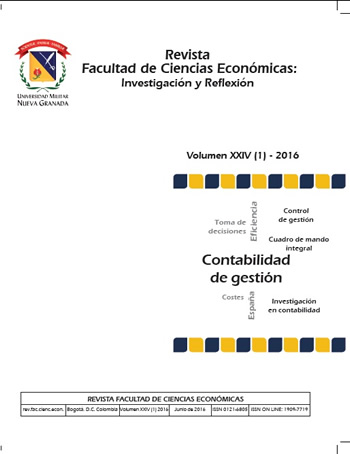Abordagem da cultura desde a pesquisa em contabilidade: possibilidades de re-significação
Resumo
O conceito de cultura trabalhou-se em contabilidade principalmente para avaliar as diferenças nos sistemas contábeis e no controle de gerenciamento entre países, com o fim de caracterizar e sobretudo comparar os elementos principais que impactam sobre a contabilidade e sobre o controle nas culturas nacionais. O trabalho de Hofstede (1980, 1984) é o referente principal da pesquisa contábil no âmbito da cultura. No entanto, não escapa de questionamentos por não considerar as construções de disciplinas que estudam o fenômeno cultural, tais como a antropologia cultural, a história, a sociologia, entre outras. O presente trabalho expõe os contextos e referentes da antropologia cultural, como elemento importante da análise da cultura. Posteriormente, se esboçam os referentes utilizados pela contabilidade para o estudo da cultura, a aplicação em seus estudos e as críticas surgidas.Downloads
Referências
Amat, O., Falguera, J., Puig, X. & Soldevilla, P. (2003). Aspectos que influyen en las diferencias internacionales en materia de contabilidad de gestión. Revista iberoamericana de contabilidad de gestión, 1(1).
Amat, O.; Blake, J.; Wraith, P. & Oliveras, E. (1999). Dimensions of national culture and the accounting environment — The Spanish case. Department of Economics and Business, Universitat Pompeu Fabra.
Bhimani, A. (1999). Mapping methodological frontiers in cross-national management control research. Accounting, Organizations and Society, 413 - 440.
Bhimani, A. (2003). A study of emergence of accounting management system ethos and its influence on perceived system success. Accounting, Organizations and Society, 28, 523 - 548.
Doupnik, T.S. & Salter, S.B. (1995). External environment, Culture and Accounting Practice: A Preliminary Test of A General Model of International Accounting Development. International Journal of Accounting, pp. 189-207.
Finch, N. (2010). Towards an understanding of cultural influence on the international practice of accounting. Journal of International Bussiness and Cultural Studies. Vol. 2. 1 – 6.
Geertz, Clifford (1992). La interpretación de las culturas. Gedisa. México.
Giménez, Gilberto (2000). Territorio, cultura e identidades. Cultura y región. CES, Universidad Nacional de Colombia, Ministerio de Cultura. Colombia.
Giménez, Gilberto (2007). Un recorrido a través del concepto de cultura. Estudios sobre la cultura y las identidades sociales. Conaculta - Iteso. México.
Gray, S. J. (1988). Towards a Theory of Cultural Influence on the Development of Accounting Systems Internationally. ABACUS, Vol. 24, No. 1, 1988, pp. 1 – 15.
Gray S.J. & Vint H.M. (1995). The impact of culture on accounting disclosures. Some international evidence. Asia Pacific Journal of Accounting, December, pp. 33-44.
Harris, Marvin (2009). Antropología cultural. Decima reimpresión. Alianza editorial, Madrid.
Harrison, G. L., & McKinnon, J. L. (1999). Cross-cultural research in management control systems design: a review of the current state. Accounting, Organizations and Society, 483 - 506.
Hofstede, G. (1980). Culture’s consequences: International differences in work-related values. Beverly Hills, California. Sage.
Hofstede, G. (1984). Culture’s consequences: International differences in work-related values. Beverly Hills, California. Sage.
Hofstede, G. (1984). The cultural relativity of the quality of life concept. Academy of Management Review, 27, 389 – 398.
Jarne, J.I. (1997). Clasificación y Evolución Internacional de los Sistemas Contables. Asociación Española de Contabilidad y Administración de Empresas. Madrid.
Martin, J. (1992). Cultures in organizations: three perspectives. Oxford: Oxford University Press
Merchant, K. A., Chow, C. W., & Wu, A. (1995). Measurement, evaluation and reward of profit center managers: a cross-cultural field study. Accounting, Organizations and Society, 20, 619 – 638.
Pourjalali & Meek G. (1995). Accounting and Culture: The case of Iran. Research in Accounting in Emerging Economies, 3, 3-17.
Schein, E. H. (2010). Organizational culture and leadership. San Francisco, CA.: Jossey Bass.
Seidler, L. J. (1967). International Accounting – the Ultimate Theory Course. The Accounting Review.
Seymour-Smith, C. (1986). Macmillan dictionary of anthropology. London: Macmilllan Press Lmt.
Tsui, J. S. (2001). The impact of culture on the relatioship between budgetary participation, management accounting systems and managerial performance: An analysis of Chinese and Western managers. International Journal of Accounting, 36, 125 - 146.











